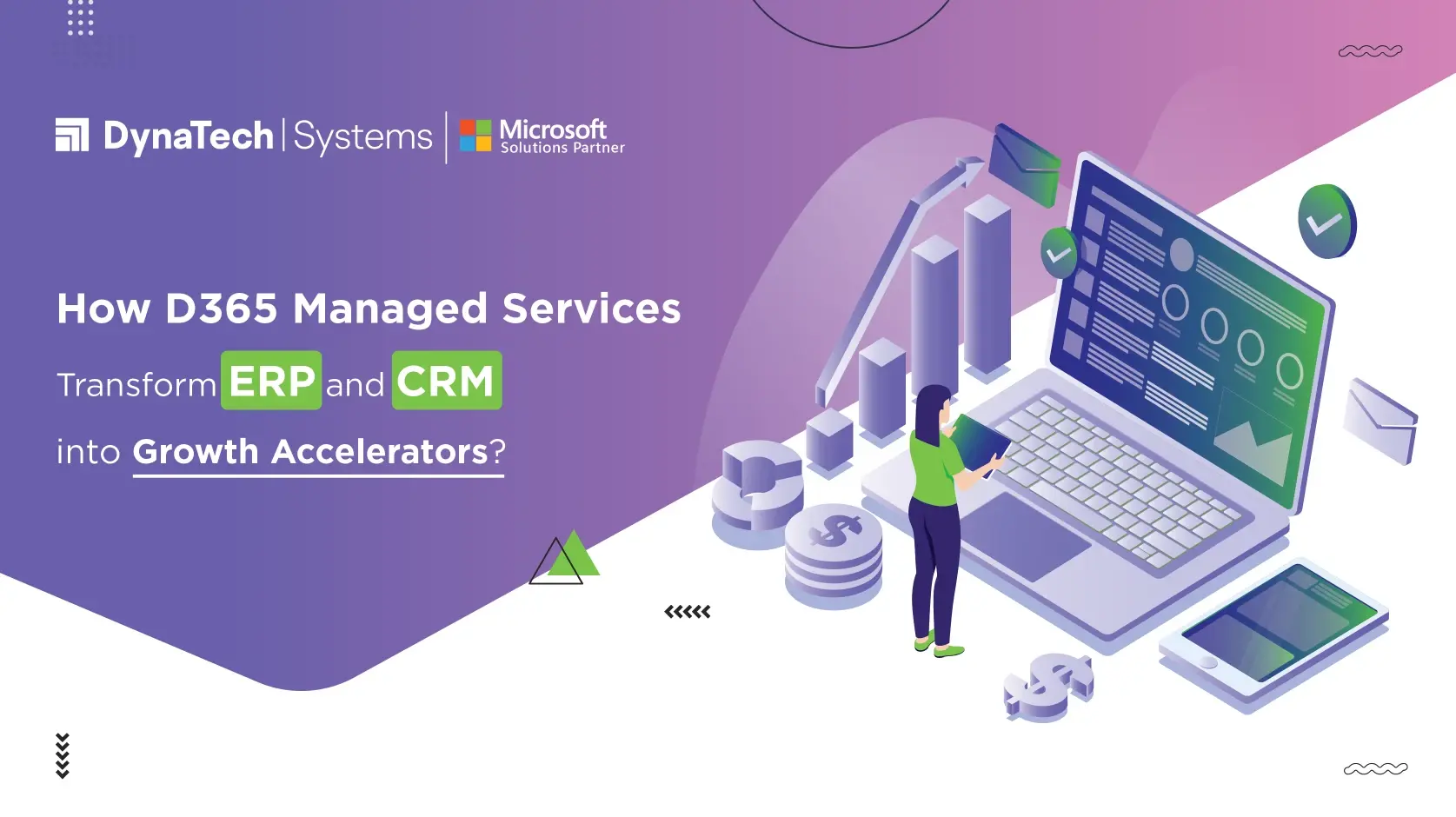Every business leader has faced the same frustration: investing millions into ERP and CRM systems only to watch them consume budgets year after year. Maintenance bills grow, upgrades disrupt workflows, and employees underuse the very tools meant to streamline operations. Instead of driving progress, ERP and CRM end up being viewed as expensive overhead.
But what if these systems could be more than just tools to “keep the lights on”? What if they could actively fuel growth, sharpen decision-making, and give your teams an edge in competitive markets?
That’s the promise of Microsoft Dynamics 365 Managed Services. By combining proactive monitoring, strategic optimization, and continuous innovation, D365 Managed Services transforms ERP and CRM from cost-heavy systems into business growth drivers.
In this blog, we’ll explore why ERP and CRM often get stuck as cost centers, how cloud-based ERP and CRM solutions managed under D365 can reverse that perception, and the steps you can take to unlock growth from your existing investment.
Why ERP and CRM Often Get Stuck as Cost Centers?
Most organizations step into cloud-based ERP and CRM solutions with high hopes. The promise is clear: smoother operations, sharper customer experiences, and processes that finally connect. Yet after the initial excitement, many teams discover a different reality.
The bills keep climbing as upgrades, patches, and integration hiccups show up one after another. Skilled talent to manage these platforms is either hard to find or expensive to retain, leaving gaps that slow progress. Employees, meanwhile, often find the tools overwhelming, using only a fraction of the features. And instead of anticipating problems, businesses scramble to fix issues only after they’ve disrupted workflows.
This constant firefighting turns ERP and CRM into something that feels more like upkeep than innovation. It’s no wonder many leaders start to view these systems as cost sinks rather than engines of growth.
But the story doesn’t have to end there. With D365 Managed Services, organizations can flip the script and finally make these platforms pay back in growth, not just in bills.
What Are D365 Managed Services?
At its core, D365 Managed Services is about offloading the day-to-day complexities of running Dynamics 365 ERP and CRM to a specialized partner. Instead of allocating internal teams to firefighting, you gain a dedicated service model that includes:
- Proactive monitoring and issue prevention
- Regular system health checks
- Custom enhancements tailored to business goals
- Seamless upgrades and patching
- 24/7 support and security oversight
Think of it as having a team of experts who not only maintain your system but also optimize it for continuous business outcomes. This flips ERP/CRM from being a passive system into a dynamic growth enabler.
How Managed Services Transform ERP/CRM into Growth Drivers?
Let’s explore the practical ways managed services for ERP and CRM can reshape the narrative.
1. Reducing Costs with Smarter Management
One of the most direct advantages of managed services is cost reduction. Companies often overspend on infrastructure, unnecessary licenses, or manual fixes. With D365 Managed Services, you can reduce ERP/CRM costs with D365 by:
- Eliminating downtime through proactive monitoring
- Avoiding unplanned expenses on emergency support
- Optimizing license usage to pay only for what you need
- Streamlining integrations to remove redundant tools
This approach ensures your ERP and CRM budgets are invested in growth initiatives rather than constant repairs.
2. Continuous Innovation Instead of Static Systems
Traditional ERP and CRM systems stagnate because updates are disruptive. Managed services change that. With cloud-based ERP and CRM solutions under D365, updates can be rolled out seamlessly, keeping your environment modern and innovative.
This allows your business to:
- Adopt new features quickly
- Gain early access to Microsoft’s AI and analytics capabilities
- Respond faster to evolving customer expectations
By maintaining an always-current system, you transform your ERP/CRM from a liability into a competitive advantage.
3. Empowering Employees with Tailored Support
Often, businesses fail to see ROI from ERP and CRM because employees don’t use the systems effectively. Managed services address this with training, custom dashboards, and continuous support.
When employees understand and trust the system, adoption increases. For instance, sales teams can maximize the CRM to close more deals, while finance teams can use ERP insights for better forecasting. This ensures your investment in Dynamics 365 ERP and CRM Services translates into measurable business outcomes.
4. Stronger Security and Smarter Compliance
Cyber threats and regulatory demands are no longer background concerns — they are daily realities for every business. Managing them in-house often drains both budgets and focus.
With Microsoft Dynamics 365 Managed Services, organizations gain continuous protection and compliance oversight. Security experts monitor systems around the clock, identify vulnerabilities before they become risks, and ensure your ERP and CRM stay aligned with the latest standards.
From GDPR in Europe to HIPAA in healthcare, compliance is built into the service. This not only helps avoid penalties but also strengthens credibility with customers and partners. In an environment where trust determines loyalty, secure and compliant systems become more than safeguards — they become catalysts for growth.
5. Scalability for Growth and Expansion
Every growing business faces system scalability challenges. As your customer base, products, or geographies expand, ERP and CRM must keep up.
With D365 Managed Services, scaling is smooth. Whether you need to add new modules, integrate with external platforms, or expand globally, the system grows alongside you without disruptions. This agility turns your ERP/CRM into a foundation for expansion, not a bottleneck.
Why Choose D365 Managed Services Over In-House Management?
The big question many leaders face is whether to manage ERP/CRM internally or outsource through a managed services model. Here’s why outsourcing is winning:
- Specialized expertise – You gain access to experts who know Dynamics inside out.
- 24/7 coverage – Unlike an in-house team with limited hours, managed services offer continuous monitoring.
- Cost efficiency – Instead of hiring full-time resources, you pay only for what you use.
- Future-proofing – D365 Managed Services partners are always ahead of technology shifts.
This combination makes managed services not just a support model but a strategic investment.
A Practical Example: Cutting Costs and Generating Value with D365
Picture a mid-sized manufacturing company. Their ERP and CRM were supposed to make things easier, but instead, they became a headache. The IT team was swamped with maintenance requests, updates dragged on for weeks, and the finance team kept wondering why costs were rising without any real payoff.
After moving to D365 Managed Services, things began to shift. Downtime dropped because issues were caught before they snowballed. Licensing was cleaned up so they weren’t paying for seats no one used. Employees finally got dashboards that made sense, showing real-time data that they could actually act on. Even compliance checks, which once caused late-night scrambles, turned into smooth, predictable reviews.
And guess what is the turning point? The systems stopped being seen as a money pit and started helping the business run better — supply chains moved faster, customers were happier, and revenue finally grew. What had once felt like an endless cycle of upkeep turned into real business momentum.
Making the Shift: From Cost to Growth
If you’re still treating ERP and CRM as back-office tools that just “keep the lights on,” it’s time to rethink. With cloud-based ERP and CRM solutions under the D365 Managed Services model, your business can:
- Minimize costs
- Maximize innovation
- Enhance employee productivity
- Strengthen compliance and security
- Scale effortlessly with business growth
Final Takeaway: Ready to Reduce Costs and Drive Growth with D365?
ERP and CRM don’t have to carry the reputation of being expensive systems that constantly drain budgets. With Microsoft Dynamics 365 Managed Services, businesses can flip that narrative and start seeing these platforms as real growth drivers. The difference comes from shifting focus — away from endless upkeep and toward smarter optimization, innovation, and long-term value.
At DynaTech, we’ve helped companies make that shift. As a trusted Microsoft Solutions Partner, our D365 Managed Services are designed to do more than keep the lights on. We personalize ERP and CRM to match your business goals, cut unnecessary costs, and open doors to new opportunities with tools like AI-driven insights.
If you’re ready to move past maintenance mode and turn your systems into engines of growth, connect with us. Visit DynaTech to learn how we can help transform your ERP and CRM from cost centers into profit-generating assets.




























